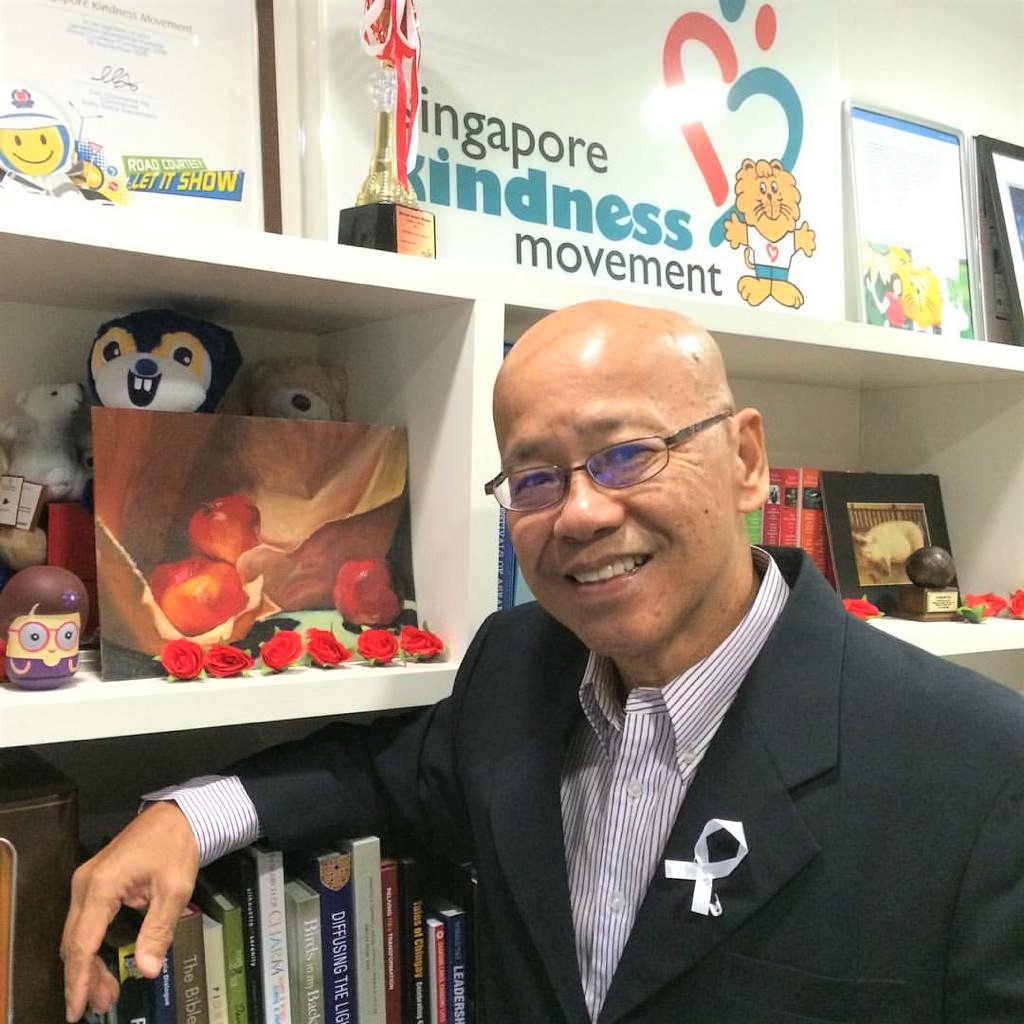“As long as there is life left to choose God, there is hope”: Prodigal-turned-pastor encourages parents whose children are far from the faith
by Christine Leow // August 13, 2021, 11:45 am

Ps Edric Sng shared his personal wilderness journey and offered encouragement to parents of prodigals on Salt&Light Family Night's most subscribed edition to date. Photo courtesy of Ps Edric Sng.
“I am here representing the story of hope,” declared Pastor Edric Sng.
The editor of Salt&Light and Deputy Senior Pastor of Bethesda Bedok-Tampines Church (BBTC) was among the panellists on Salt&Light Family Night (July 27) to discuss the topic of children straying from the faith.
This episode of the Zoom chat show saw the highest attendance since Salt&Light Family Night launched in August 2020 – a heartbreaking indication of what is upon the hearts of families. More than 1,600 registered for the 1,000 seats available.
Ps Edric, 41, one of the guests on the panel, talked about a season in his in life, beginning in his mid-teens, when he, too, was “out in the wilderness … seemingly hopelessly lost”, from close brushes with the law to years of hedonistic living.
“I did basically stumble into my own life. By the age of 14, 15, I don’t think my parents had any input.”
Encouraging parents whose children have strayed, he said: “It happens, don’t blame yourself.”
The son of a deacon who continues to serve in the senior fellowship of BBTC, Ps Edric said his prodigal past had nothing to do with how he was parented.
“My parents were decent, good, Christian people.”
Though they served at church almost every night, he never felt abandoned. His parents – both English teachers – always made time for him. It wasn’t their fault, he said.
“I basically stumbled into my own life. By the age of 14, 15, I don’t think they had any input into what they could have me say, or do, or think.
“My life was my life. My thought process was my thought process. As soon as I could stop being forced to go to church, I stopped going to church.”
At one point, he dyed his hair green. While having lunch with his parents, one of his father’s students spotted them.
“As long as God doesn’t give up on your kid, you don’t give up on your kid.”
“He said, ‘Cher, that’s your son?’ And I think my father would probably have preferred to say, ‘I don’t know who he is!’ I was that kind of a son.”
For the next 10 to 12 years, Ps Edric was out of the church. Today, he is a pastor leading next-generation pastors. He also helms three Christian digital media platforms, including Salt&Light.
To the parents struggling to hold on to their children, he said: “If your child is that wilderness child, that prodigal son, or whatever the situation might be, I just want you to remember this very simple exhortation: Don’t give up.
“As long as God doesn’t give up on your kid, you don’t give up on your kid.”
Prodigal stories ending in hope
Many viewers who turned up understood first-hand the pain of parenting a prodigal. In a Slido survey conducted that night, 31% said they had a child who had left the Christian faith. More than 2 in 5 of these children are aged between 19 and 25.
Continuing the theme of hope, Reverend Dr William Wan, 74, the Secretary General of the Singapore Kindness Movement, and June Chuah, 54, a missionary, also talked about their children’s descent into drugs and destructive lifestyles before returning to the faith.

For more than a decade, Rev Dr William Wan journeyed with his daughter who chose to drop out of school and leave home in her teens. Photo courtesy of Rev Dr William Wan.
Dr Wan’s daughter fell in with the wrong crowd in her early teens while he was pastoring a church in Washington DC, USA. By 14, she had turned from a “very mild, lovable, adorable girl” into an unrecognisable teen who lived the punk lifestyle.
At 16, she dropped out of school and left home.
The couple went through “long periods of great despair, stress and tension” as they fought to keep their children alive.
Recounted Dr Wan: “She said, ‘Mum and dad, I love you very much. But you know we can’t get along. It pains me to make you so sad.
“You will probably be happier if I don’t stay home, I just need to find my own way.’”
There was no stopping her, so they let her go.
At 20, she became pregnant. By her early 20s, she had divorced her drug addict husband to raise their son on her own.
She would later turn her life around to earn a PhD. Her son is now 25 and on his way to getting a PhD in robotics engineering.

June (second from right) standing with her husband, Kari Ahola, and their son (standing, left) with his wife. Their daughter and her husband are seated. For seven years, June and her husband struggled to bring their children back to the faith. Photo courtesy of June Cheah.
Missionary June Chuah’s son and daughter had their wild years as well.
Her son fell into depression at 15, self-harmed and attempted suicide. To numb his pain, he went into drugs and alcohol.
“There was a lot of anger inside him.”
Her daughter, after several failed tries at drug rehabilitation, one day called her to say: “Mum, I need Jesus.”
While dealing with their son, June and her husband Kari Ahola, 56, also had to manage their 17-year-old daughter who was smoking marijuana with the youths in the church they had planted in Spain.
“That would be the beginning of her journey into a lot of lies, rebellion, toxic relationships.”
For seven years, the couple went through “long periods of great despair, stress and tension” as they fought to keep their children alive because “our children were really between life and death”.
They also faced judgement from fellow Christians.
“Because we were in ministry, when we meet other pastors and ministers, you would see that they had the thought: Honestly, what did you do wrong?”
They tried everything from psychologists and psychiatrists to inner healing, deliverance, tough love, unconditional love and “praying our socks off”.
“We know God is faithful but I didn’t know how long it would take.”
June’s son would eventually “find his way back to God”. Her daughter, after several failed tries at drug rehabilitation, would one day call her to say: “Mum, I need Jesus.”
Said June: “It’s the faithfulness and the mercy of God. As a family, we are the trophy of God’s grace “in spite of” – in spite of the mistakes my husband and I made, in spite of our kids’ poor choices, in spite of circumstances that were often beyond us.
“In God’s kingdom, we don’t often have a time frame. We know God is faithful but I didn’t know how long it would take praying for my children.
“That would be the hard part. Then you find it is really tough to keep the hope alive.
“The bottom line for me always was knowing that I believe God would come through for my children.”
How to keep the hope alive
June shared practical ways she “fed the hope” during the years her children were astray.
1. Go after testimonies of prodigals who come back
She read books and articles that told of returning prodigals.
That was how she came across Dr Wan’s testimony. She had friends who knew him and she asked them to set up a meeting with him.
“I wanted to hear the story.”
2. Feed on the Word of God
“(Hold on to it) when God gives you a specific promise. For both my kids, I really had the rhema (spoken) word which I held on to.
“Often when it looks like things go from bad to worse, you feed that hope with the Word of God.”
3. Find people who support you
June made sure she had one or two friends who would remind her of the faithfulness of God and His promises when “things look like they were absolutely falling apart”.
“That person would feed the hope in me.”
4. Hold on to prophetic words
“I do believe in the prophetic word – it paints a picture of what the future would look like.”
June went to known prophets and asked them to pray for her children.
“Some key people gave a very clear word, especially for my daughter, that have come to pass.
“That word held me because it gave me a glimpse of what she was created to be, even though in reality she seemed to go from bad to worse.”
5. Meet with God
June would go for meetings to encounter God.
“I said, ‘I have got to meet with God here. Lord, speak to me.’”
6. Trust the seeds sown in their childhood
To these, Ps Edric added: “The things that we sow in our kids in their younger years, they do stick – although you don’t know when the muscle memory will come back.”
What if they don’t want to go to church?
Speaking from his personal experience in his teens, Ps Edric said: “If you pushed me to go to church back then, you might win the battle in the body, but you will lose the battle in my soul.”
He added that, if forced, a child may show up and may even hide his displeasure, but he would be “utterly miserable … counting down the days till he cannot be forced to come back anymore”.
“The older they are, the less control you have over them,” he said.
From early teens onwards, taking a hard line will not work, he added.
“If you pushed, you might win the battle in the body, but you will lose the battle in my soul.”
“We need to help people see the value and merit in that which we want them to do. When it comes to church, you want them to look at you as the parents, and they should want to go to church because they see what an amazing thing God has done in your life.
“They see what amazing gentleness of heart, how overflowing with love you are, that they also want to go to church.
“Their picture of God is what they see in you.”
That may involve, on the parents’ part, character change, change of habits and even change in family dynamics, said Ps Edric.
Dr Wan agreed: “I wouldn’t push my kid. Knowing Jesus and knowing God is the most important.
“It’s the Lord Jesus Christ who must help our kids to see the need to be worshipping in the community.”
What if our kids are straying because of LGBTQ issues?
Said Ps Edric, “Parents may have a very strict and clear worldview and faith-view: Some things cannot, some things can.
“But for the child, that is not how they are seeing things. What they are seeing is that this is the most important decision of their lives.
“And it’s really, really important to hear them out, to listen.”
“Our children must feel that no matter how they think they have disappointed or hurt us, they know that we love them.”
Listening would mean having a loving, accepting response even when they do or say something that is not of your world view.
“We may not be able to dissuade them. But at the very least, we should aim to have them near enough so that we still have a relationship with them. So that – who knows at what point – if they change their minds about things or something happens along the way, at least you will be there for that moment to welcome them back home.”
Agreed Dr Wan: “Our children must feel that, no matter how they think they have disappointed or hurt us, they know that we love them and it is unconditional.
“We don’t say, ‘Come back only when you are changed or you become a better person.’ You say, ‘Our door is always open.’”
So, even though his daughter moved to Canada when she was 16 while the Wans remained in the US, the family kept in touch. They continued to speak and write to her.
What if they expect proof that there is a God?
The panellists agreed that going into an apologetics argument would be counter-productive.
“If there is God, no arguments against His existence will make Him not exist.”
Said Ps Edric: “Some of them are just going to insist on valuing certain types of science more than they will value the theological argument and you can’t beat that out of them in an argument.
“God needs to reveal Himself to be true to them in a way that they, at some point in their lives, cannot deny it and will, at some point, go, ‘I have no idea what just happened and how to explain it but I felt something.’
“You’ve got to pray for that miracle to happen because – at that point when only the Holy Spirit could do it – they will realise that there is something they can’t out-argue or out-reason.”
That “miracle” was precisely what June prayed for her children.
“If your child doesn’t seem to want to come back, don’t blame yourself.”
“For my kids to fall desperately in love with Jesus – that was what I prayed for. ‘Jesus, they have got to meet You.’
“Because once their hearts are captivated, everything will fall in place.”
Added Dr Wan: “If there is God, no arguments against His existence will make Him not exist. If there is no God, no argument, however strong, will make Him exist.
“Believing in God is not about reasoning. It is about experiencing God.”
How do we reach our children if they are not talking to us?
That is when the whole community of faith comes in, said the panellists.
“Somewhere in the church, there is one person who can still connect with your child,” said Ps Edric.
“Try to find that person who can speak into their lives and work through that person.”
Dr Wan has had the opportunity to be that someone for straying children and he always makes it a point to reconcile the children to their parents.
What if our children never return?
In answer to this question, Ps Edric offered perhaps the night’s greatest encouragement.
“If your child didn’t, hasn’t or doesn’t seem to want to come back, really, really don’t blame yourself. Don’t be too hard on yourself.
“There are probably things you could have done better, but don’t stay in that place of condemnation,” he said.
“While that window of grace is open, we fight, we contend for the salvation of our loved ones.”
Our children are their own persons with their own free will, added Ps Edric. At some point, “there will be a line beyond which we can’t do anything about some of the choices they make”.
Instead, parents must look to “the window of grace” (Isaiah 55) which stays open as long as “there is a life left for us to choose God”.
“While that window of grace is open, we fight, we contend for the salvation of our loved ones.
“Should that window of grace slam shut, you still live in that grace. Don’t let yourself forget that you are a child of grace, a child of the promise.
“Someday, you’ll have a conversation with God about it. Someday, you’ll understand and see certain things happening in your child’s life story that maybe you didn’t, at this point, have insight into.
“At that point, you’ll learn that you did your best.”
A recording of this episode, and all other episodes, can be viewed on Salt&Light’s YouTube channel.
Read the first story on this episode of Salt&Light Family Night here.
RELATED STORIES:
“I offered to resign from my church”: The heartache Dr William Wan felt when his daughter strayed
Love them, just love them: The missionary couple who prayed their prodigal children home
We are an independent, non-profit organisation that relies on the generosity of our readers, such as yourself, to continue serving the kingdom. Every dollar donated goes directly back into our editorial coverage.
Would you consider partnering with us in our kingdom work by supporting us financially, either as a one-off donation, or a recurring pledge?
Support Salt&Light



